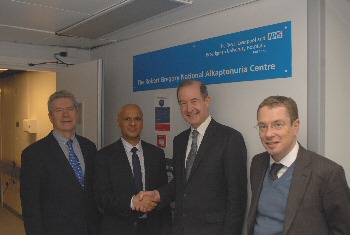Liverpool 'clinical trial' success receives global acclaim

A national lead for the NHS in
monitoring rare diseases; Dr Edmund Jessop; has visited The Royal Hospital and
described the National AKU Centre on ward 9B as the 'largest and best AKU
research base' in the world.
Dr Jessop, who is public health adviser to the highly specialised services team
at NHS England made the trip from London to hear all about Prof. Lakshminarayan
Ranganath's pioneering trials.
Prof. Ranganath's the co-founder and medical director for the National AKU
Centre, based at the hospital. Alkaptonuria (AKU) - known as 'black bone
disease' - is a genetic disease which damages the bones and cartilage.
It is extremely rare and usually affects one in every 250,000 people worldwide
although in some parts of the world it can affect up to 1 in 125 people;
eventually confining patients to a wheelchair.
Also in attendance was Liverpool University's Prof. Jim Gallagher who is in the
Institute of Ageing and Chronic Disease along with Alkaptonuria Society chief
executive, Dr Nicolas Sireau, who travelled from Cambridge to listen to the
latest findings from the clinical trials.
They heard that year 1 of the pioneering clinical trial; the 1st of its
kind worldwide; saw 128 AKU patients recruited to 3 treatment centres in
Liverpool, Slovakia, and France. The initial results have indicated a:- 'major
breakthrough' being on the cards and the success is attracting attention from
doctors and AKU patients from around the globe.
The drug used in the trial; called:- 'nitisinone'; was originally
developed as a weed killer, but during toxiCity testing it was revealed that it
blocked the breakdown of amino acid, called tyrosine, which plays a crucial role
in the development of AKU.
Dr Jessop said:- "Although rare, this is a particularly nasty disease for
which there is currently no cure. The set up here in Liverpool is excellent -
it's an 'expert centre' with the advantage of having different specialist
metabolic support services, for example, ophthalmic, cardiology and orthopaedic
surgery are all available in close proximity. This all really helps as the
doctors are able to identify similarities with AKU patients; capture the
information and knowledge; then understand the best way to treat or operate on
future patients."
The drug used in the trial; called:- 'nitisinone'; was originally
developed as a weed killer but during toxiCity testing it was revealed that it
blocked the breakdown of amino acid, called tyrosine, which plays a crucial role
in the development of AKU.
Early findings of the 60 month clinical trial have shown the treatment has
reduced the amount of homogentisic acid in patients' urine by 98.8%.
Prof. Ranganath, consultant physician, at the Royal Liverpool University
Hospital, added:- "I would like to thank everyone for coming along to
Liverpool to find out more about our first year of the AKU clinical trial. Early
signs are more than encouraging; we are determined to find a cure for this nasty
disease and totally eradicate it, once and for all."
AKU is a hereditary disease; the condition is debilitating and without
treatment patients develop serious joint disease. Traditional treatments include
pain management and joint replacement surgeries, although these do little to
slow down the progression of the disease.
The condition usually starts to affect a person's spine in their mid-20's and
then goes on to have a detrimental effect on everything they do in life and
sadly ends up with AKU patients confined to a wheelchair.
The National AKU Centre on ward 9B at the Royal was named after Liverpool born
Robert Gregory, whose case kick started the research into the disease by
clinicians and researchers from the hospital. Robert sadly passed away in
October 2014.
Who is affected?
UK - 1 in 250,000
Jordan - 1 in 250
Dominican Republic - 1 in 19,000
Research is on going to find out why the mountainous parts of north west Slovakia has much higher rates of AKU cases.






